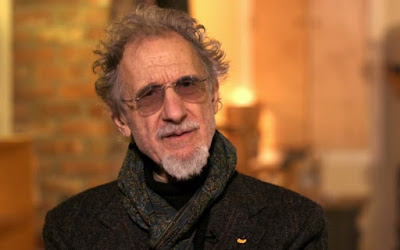The idea that anyone -- back in 1973 when the film Serpico first appeared, or now, some 45 years later, with the DVD release of the new documentary, FRANK SERPICO, about that New York City cop-turned-whistleblower --- could question whether Frank Serpico was a hero or a "rat" (as so many of his fellow cops, a lot of whom were corrupt, on-the-take sleaze-bags, would call him then and still do today), offers a clear perspective as to why the United States of America continues to struggle so mightily for anything approaching justice and parity for its citizens.
While the earlier film, directed with his usual grit and realism by the late Sidney Lumet, was terrifically entertaining and timely (and remains so today), the new documentary written, produced and directed by Antonino D'Ambrosio (shown at left), proves a surprising and often fascinating addition to the Serpico story.
Mr. D'Ambosio's name seemed somewhat familiar to TrustMovies, so I checked my past posts to find I'd reviewed an earlier film of his, another documentary concerned with American justice entitled Let Fury Have the Hour (click the link for the review).
I'm happy to report that the filmmaker's new documentary is a considerably more cogent and focused piece of work.
Beginning with a scene in which Mr. Serpico (shown above, back in the 70s, and below more currently) explains how, as a police officer, he had to arrest prostitutes and how much he detested that kind of work, the documentary then moves to American history and our country's anti-Italian prejudice, Serpico's own family history, including his grandfather and father, from both of whom he seems to have inherited much of his moral compass.
This fellow proves quite a low-key but very compelling host and raconteur, and D'Ambrosio's filmic style, perhaps deliberately in keeping with that of his subject, is measured and quiet, never glossy nor hyped. Together, filmmaker and subject make for an excellent combination that never needs to plead for our trust but instead gets it quite naturally.
This shooting takes place midway through the film and its aftermath, which is, in a sense, still going on, takes up the remainder of the movie. We learn how Serpico, once he got out of the hospital, managed to get the police report regarding his shooting, which showed that, instead of the police themselves reporting one of their own being felled, the call to the police actually came from a civilian. That's how much the cops cared about saving the life of this man.
Then we see a little of the famous Knapp Commission, in which NYC police corruption was investigated, and to which Serpico provided much of the background and evidence. We hear (and see now) from his then-lawyer, Ramsey Clark (above, left).
Over a drink, we're privy to a meeting between him and his ex-partner in which that partner accuses Serpico of only going after cops as the bad guys but not their bosses. "How would you do that?" Frank asks him. "I don't know. I didn't even try," comes the abashed response. We see and hear a lot about the negative response to Serpico's whistleblowing, and how the police want to paint it all as "us against them." But, as Ramsey Clark points out, that is incorrect because in reality, "It's only us." Or it should be. Funny how power and corruption always divide things.
From Sundance Selects and IFC Films, Frank Serpico hits the street on DVD tomorrow, Tuesday, March 13 -- for purchase and/or rental.













































